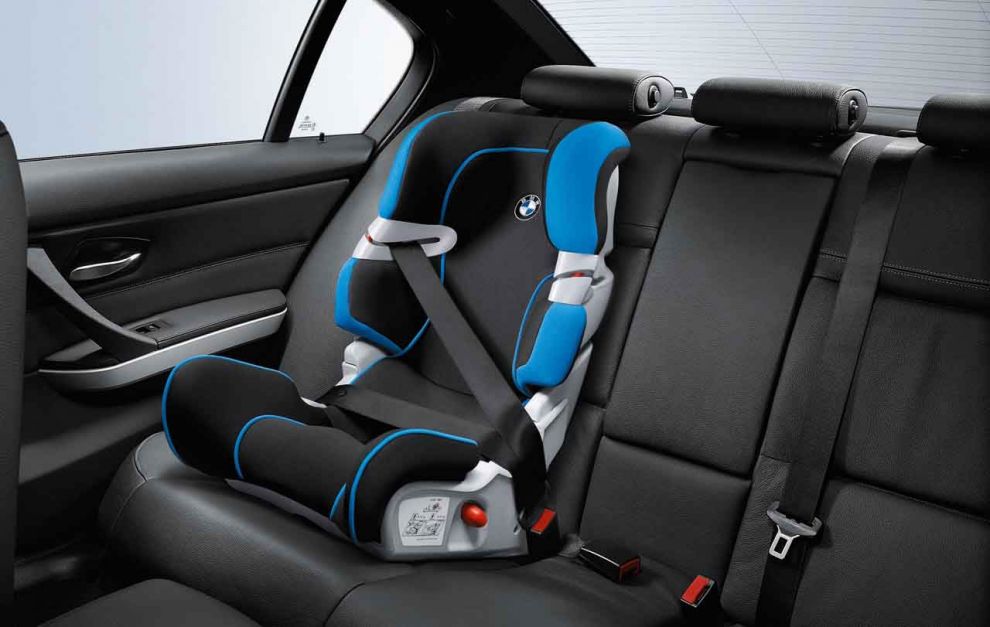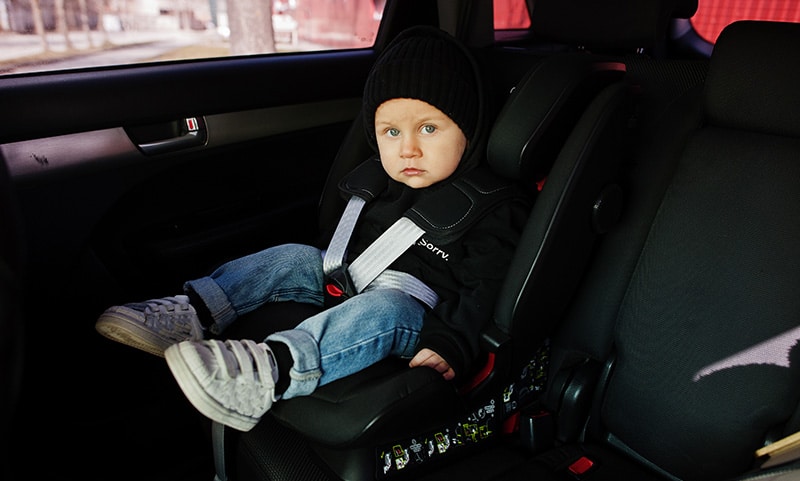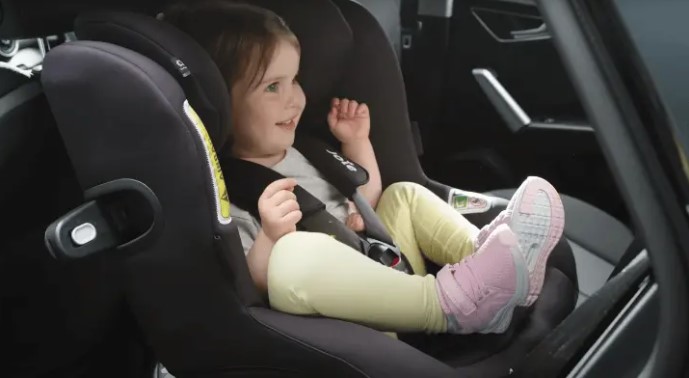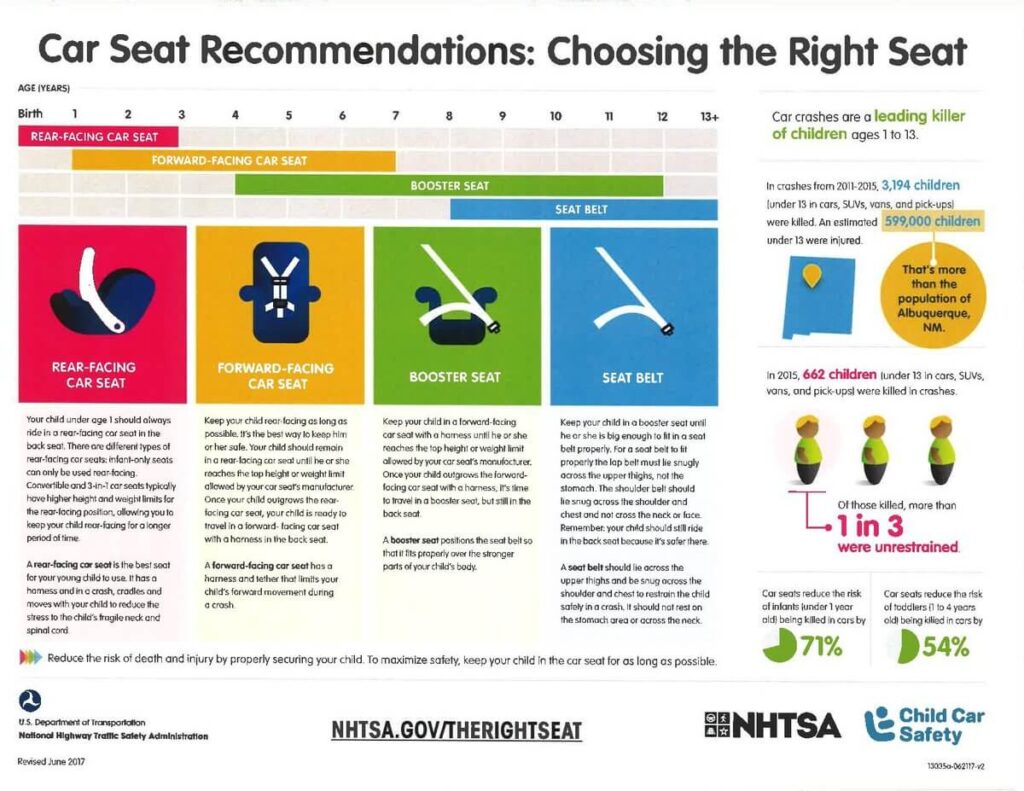Child car seat laws in Illinois are designed to keep children safe and prevent injuries or fatalities in the event of an automobile accident. These laws require that all children under 8 years old be secured by a safety belt system or a child restraint device.
Such as a car seat, booster seat, rear-facing infant carrier, etc., depending on the age and size of the child. Additionally, infants and toddlers must ride in rear-facing seats until they reach the age of two.
In addition to meeting these requirements for proper car seat use, parents should also make sure their vehicles are regularly inspected for safety issues and any recalls on child restraint systems have been addressed.
In this document, we will explore every detail about Child Car Seat Laws Illinois to keep you informed and ensure the safety of your kids. So, stay tuned.

Child Car Seat Laws Illinois: What You Must Know?
In Illinois, children must be properly restrained in a car seat or booster seat appropriate for their age and size until they are 8 years old. All children under the age of 2 must remain rear-facing until they reach the highest weight or height limits allowed by their car seat manufacturer.
Children between the ages of 2 and 4 must use a forward-facing child restraint system with an internal harness.
Once a child reaches 40 pounds, he or she can transition to using a belt-positioning booster seat in combination with the vehicle’s lap and shoulder safety belts. Children between 8 and 16 years old must wear both lap and shoulder belts at all times while riding in any motor vehicle on Illinois roads.
The driver is responsible for ensuring all passengers under 18 years of age are restrained appropriately according to these laws; failure to do so may result in fines up to $75 per passenger not properly restrained.
Forward facing car seat weight illinois
Forward-facing car seats are designed for children who have outgrown the rear-facing seat and meet certain size and weight criteria. The weight limit for forward-facing car seats can vary depending on the specific seat and manufacturer. Commonly, they are suitable for children weighing between 40 and 65 pounds, but this can vary.
To get the most accurate and current information, it’s recommended to check the Illinois Department of Transportation’s official website or contact their office directly.
Illinois Car Seat Laws Height And Weight 2024
The Illinois car seat laws height and weight 2024 are as follows:
- All children under the age of 2 must be in a rear-facing child safety seat unless they weigh more than 40 pounds or are more than 40 inches tall.
- Children ages 2 to 4 must be in a forward-facing child safety seat with a harness until they weigh more than 40 pounds or are more than 40 inches tall.
- Children ages 4 to 8 must be in a forward-facing child safety seat with a harness or booster seat until they are at least 4 feet 9 inches tall.
- Children ages 8 to 12 must be in a booster seat until they are at least 4 feet 9 inches tall.
- Children 12 and older must be properly secured in a seat belt.
It is important to note that these are just the minimum requirements. The American Academy of Pediatrics (AAP) recommends that children under the age of 2 stay in a rear-facing car seat until they reach the highest weight or height limit allowed by their car seat manufacturer.
The AAP also recommends that children stay in a booster seat until they reach 4 feet 9 inches in height and can sit properly in a seat belt, which means that their back is against the seat and their knees are bent at a 90-degree angle.
If you have any questions about Illinois car seat laws or how to choose and install the right car seat for your child, please contact the Illinois Secretary of State’s office or a certified child passenger safety technician.

What is the Age And Weight Requirement for a Booster Seat in Illinois?
In the state of Illinois, children between the ages of 8 and 16 must use a booster seat when riding in a vehicle. The minimum weight requirement for a booster seat is 40 pounds.
However, it is recommended that children remain in their forward-facing car seats until they reach at least 4 feet 9 inches tall.
Booster seats are designed to help raise a child so that the lap and shoulder belts fit properly across their body and provide greater protection during an accident.
It’s important to note that all children under 13 should ride in the backseat whenever possible for added safety.
When Can a Child Stop Using a Car Seat in Illinois?
In Illinois, the law requires children to remain in a car seat or booster seat until they are 8 years old and at least 4 feet 9 inches tall. At this point, they can use an adult safety belt without a booster.
However, it is important to note that some organizations may recommend your child stay in one longer than Illinois law requires for their own safety.
For example, the American Academy of Pediatrics recommends all children ride rear-facing as long as possible up to age 2 and then transition into forward-facing car seats with harnesses until 4 years old before switching to boosters.

What is the Age And Weight Limit for a Child to Be in a Car Seat?
The age and weight limit for a child to be in a car seat depend on the type of car seat being used. Generally, infants should remain in rear-facing seats until they are 2 years old or reach the highest weight or height allowed by their particular seat.
Once children outgrow their rear-facing seats, they should move into forward-facing seats with harnesses until they reach 4 years old or the maximum weight and height limits set by their car seat manufacturer.
After that, if the child is under 4′ 9” tall, they can ride in booster seats with both lap and shoulder belts until they fit properly in adult safety belts. There is no specific age or weight limit for when a child can safely transition from using a booster seat to an adult safety belt, as it varies depending on each individual’s size.
However, typically, children should use boosters up to 8–12 years old before transitioning to an adult belt system.
What are the Child Car Seat Laws in the State of Illinois?
In the state of Illinois, a child must be secured in a car seat or booster seat until they are 8 years old or at least 80 pounds. In addition, children younger than 2 must ride in a rear-facing car seat, and all car seats must meet federal safety standards.
The backseat is the safest place for children to ride, and it’s recommended that you keep your child in their car seat for as long as possible.
It’s also important that the harness straps fit snugly against the body and not be twisted. Lastly, make sure to register your car seat so that you can receive notifications if there is ever a recall on any parts used in its manufacture.
Illinois Car Seat Laws Height And Weight
Illinois has a strict set of car seat laws that must be followed in order to keep children safe while riding in vehicles. According to the law, children must remain in an appropriate child safety seat until they are at least 8 years old and over 80 pounds.
Additionally, all children under the age of 2 or who weigh less than 20 pounds must always ride in a rear-facing car seat, regardless of their height.
It is also important for parents to know that forward-facing seats may not be used until the child is both over age two and over 25 pounds.

Illinois Car Seat Laws Weight
Illinois car seat laws are based on the weight of your child. Children under the age of 8 must be properly secured in a car safety seat or booster that is appropriate for their height and weight. For children weighing between 20 and 40 pounds, a rear-facing car safety seat is required.
For children over 40 pounds but less than 80 pounds, a forward-facing car safety seat with an internal harness system should be used. Finally, all children over 80 pounds must use either a belt-positioning booster seat or another type of appropriately fitting restraint system to ensure safe transport while traveling in an automobile.
How Much Do You Have to Weigh to Sit in the Front Seat of a Car in Illinois?
In Illinois, the law states that all drivers and front-seat passengers must be properly secured with a safety belt. In order to fit into a standard seatbelt, adults should weigh at least 100 pounds or more, although individual car manufacturers may have higher requirements for their specific models.
When in doubt, always refer to the owner’s manual of your vehicle to determine the minimum weight requirement.
When Can a Child Sit in the Front Seat Illinois?
In Illinois, children under the age of 8 must be secured in a car seat or booster seat and must ride in the backseat. However, starting at age 8, a child may ride unrestrained in the front seat as long as they are tall enough to do so safely (at least 4’9″ inches).
Children over this height can also choose to remain secured in a car or booster seat if they wish.
Is It Illegal for a 10 Year-Old to Ride in the Front Seat?
Yes, it is illegal for a 10-year-old to ride in the front seat of a car. All states have laws that require children under the age of 12 or 13 to be secured in an appropriate child safety seat.
Depending on where you live, this may range from being seated in the backseat with a booster seat to being properly secured with an infant or child car seat.
Additionally, most states also make it illegal for anyone under the age of 18 to sit in the front passenger’s seat unless accompanied by an adult over 21 years old.
Illinois Booster Seat Law Height
In Illinois, children under the age of 8 must be in a child safety seat or booster seat while riding in a motor vehicle. The law requires that the child’s height and weight meet specific requirements to qualify for the use of a booster seat.
Generally speaking, if your child is 4 feet 9 inches tall or taller, they are not required by law to sit in a booster seat.
However, it is still strongly recommended that all children who have outgrown their car seats continue to ride in a booster until they reach at least 4 feet 9 inches tall and weigh between 80 and 100 pounds.

Can a 10 Year Old Sit in the Front Seat in Illinois?
In Illinois, the law states that any child under the age of 8 must ride in a car seat in the back. However, if a 10-year-old meets certain criteria, they may be allowed to sit in the front seat. In order for this to be legal, they must be 4’9” or taller and wear a seat belt that properly fits them.
Illinois Car Seats Laws Explained
Illinois Child Passenger Protection Act
The Illinois Child Passenger Protection Act, enacted in 2019, requires all children under the age of two to be secured in a rear-facing car seat while riding in a motor vehicle. It also states that any child over the age of two must either remain in a rear-facing car seat or use an appropriate forward-facing restraint system.
The law further stipulates that all children should remain properly restrained until they reach 8 years old and have outgrown their safety seat, according to both height and weight limits set by the manufacturer.
Furthermore, it is required for all passengers who are 15 years old or younger to wear a seatbelt, regardless of which seating position they are occupying.
Conclusion
Child car seat laws in Illinois are essential to keeping children safe while traveling. While some of the laws may seem strict, they have been designed with the safety of children in mind.
It is important for all parents to be aware of and stay up-to-date on these regulations so they can make sure their kids are as safe as possible when riding in a vehicle.
By following these rules, parents can help keep their children secure and protected during each ride.
